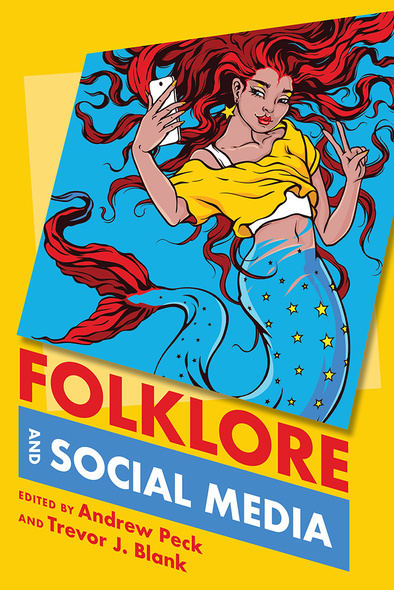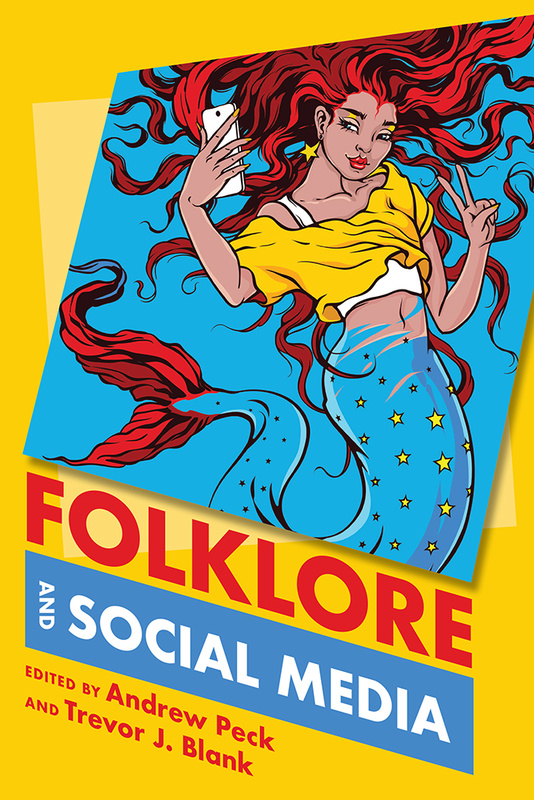Ten years after the publication of the foundational edited collection Folklore and the Internet, Andrew Peck and Trevor J. Blank bring an essential update of scholarship to the study of digital folklore, Folklore and Social Media. A unique virtual, hybridized platform for human communication, social media is more dynamic, ubiquitous, and nuanced than the internet ever was by itself, and the majority of Americans use it to access and interact with digital source materials in more advanced and robust ways.
This book features twelve chapters ranging in topics from legend transmission and fake news to case studies of memes, joke cycles, and Twitter hashtag campaigns and offers fresh insights on digital heritage and web archiving. The editors and contributors take both the “digital” and “folklore” elements seriously because social media fundamentally changes folk practices in new, though often invisible, ways. Social media platforms encourage hybrid performances that appear informal and ordinary while also offering significant space to obfuscate backstage behaviors through editing and retakes. The result is that expression online becomes increasingly reminiscent of traditional forms of face-to-face interaction, while also hiding its fundamental differences.
Folklore and Social Media demonstrates various ways to refine methods and analyses in order to develop a better understanding of the informal and traditional dynamics that define an era of folklore and social media. It is an invaluable addition to the literature on digital folklore scholarship that will be of interest to students and scholars alike.
Contributors:
Sheila Bock, Peter M. Broadwell, Bill Ellis, Jeana Jorgensen, Liisi Laineste, John Laudun, Linda J. Lee, Lynne S. McNeill, Ryan M. Milner, Whitney Phillips, Vwani Roychowdhury, Timothy R. Tangherlini, Tok Thompson, Elizabeth Tucker, Kristiana Willsey
This book features twelve chapters ranging in topics from legend transmission and fake news to case studies of memes, joke cycles, and Twitter hashtag campaigns and offers fresh insights on digital heritage and web archiving. The editors and contributors take both the “digital” and “folklore” elements seriously because social media fundamentally changes folk practices in new, though often invisible, ways. Social media platforms encourage hybrid performances that appear informal and ordinary while also offering significant space to obfuscate backstage behaviors through editing and retakes. The result is that expression online becomes increasingly reminiscent of traditional forms of face-to-face interaction, while also hiding its fundamental differences.
Folklore and Social Media demonstrates various ways to refine methods and analyses in order to develop a better understanding of the informal and traditional dynamics that define an era of folklore and social media. It is an invaluable addition to the literature on digital folklore scholarship that will be of interest to students and scholars alike.
Contributors:
Sheila Bock, Peter M. Broadwell, Bill Ellis, Jeana Jorgensen, Liisi Laineste, John Laudun, Linda J. Lee, Lynne S. McNeill, Ryan M. Milner, Whitney Phillips, Vwani Roychowdhury, Timothy R. Tangherlini, Tok Thompson, Elizabeth Tucker, Kristiana Willsey
‘This text is an essential contribution to the field. Scholars need it right now, and its publication lays groundwork for future scholars.’
—Claire Schmidt, Missouri Valley College
‘The fruition of mature scholarship on folklore and digital technology. With this volume, readers will be able to clearly see that this area of scholarship is more than a novelty: it is an essential, perhaps the essential, terrain of study for folklorists in the coming years.’
—Anthony Bak Buccitelli, Penn State Harrisburg‘This collection of diverse and interesting case studies by leading folklorists in the field is highly absorbing and immensely useful. Folklore and Social Media is essential reading for those interested in digital folklore or the development of folklore more broadly and will undoubtedly be a key text in the discipline going into the future.’
—Folklore
‘This volume offers an excellent opportunity to consider the nature of contemporary folklore as it intersects with our everyday deployments of the most ubiquitous of digital communication technologies: social media.’
—Journal of Folklore Research Reviews
Andrew Peck is assistant professor of strategic communication at Miami University. He is a media scholar and ethnographer whose research focuses on how digital media offer new possibilities for persuasion and everyday communication. His work has appeared in the International Journal of Communication, the Journal of American Folklore, and the edited collections Hashtag Publics and Slender Man Is Coming.
Trevor J. Blank is associate professor of communication at the State University of New York at Potsdam. He is the editor of Folklore and the Internet and Folk Culture in the Digital Age, coeditor of Tradition in the Twenty-First Century, and author of The Last Laugh: Folk Humor, Celebrity Culture, and Mass-Mediated Disasters in the Digital Age and Toward a Conceptual Framework for the Study of Folklore and the Internet.
Trevor J. Blank is associate professor of communication at the State University of New York at Potsdam. He is the editor of Folklore and the Internet and Folk Culture in the Digital Age, coeditor of Tradition in the Twenty-First Century, and author of The Last Laugh: Folk Humor, Celebrity Culture, and Mass-Mediated Disasters in the Digital Age and Toward a Conceptual Framework for the Study of Folklore and the Internet.






